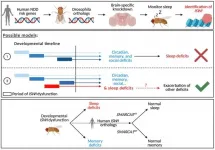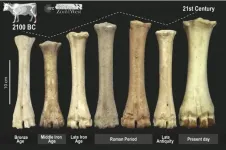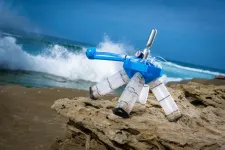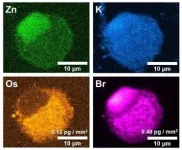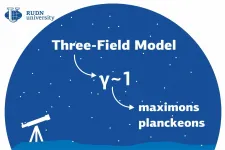A team at Cambridge's School of Medicine carried out a systematic review looking at the existing evidence on different approaches to tackling loneliness and social isolation. While all the individual studies were carried out pre-pandemic, the team considered which approaches might be feasible when people are still required to socially distance. Their results are published today in PLOS ONE.
At the start of the pandemic in the UK, over 1.5 million people were told they must self-isolate or shield themselves for a period of at least 12 weeks. Strict social distancing guidance advised the public to stop all non-essential travel and stay at home. While these measures were initially eased, social distancing measures remain in place, cases and contacts are required to self-isolate, and further lockdown measures have been re-introduced.
One possible consequence of both the shielding of vulnerable people, and the social distancing restrictions for all, is for physical separation to lead to social isolation and loneliness. There is strong evidence that both social isolation and loneliness are linked to cardiovascular disease, depression and anxiety. This means there is an urgent need to identify effective interventions to combat this problem.
A team led by Dr Christopher Williams, at the time University of Cambridge medical student, identified 58 relevant studies of interventions to reduce social isolation, social support and loneliness that could potentially be adapted for people living in pandemic-related isolation. Most of the studies (51 out of 58) related to older people - a group that often face the strictest limitations imposed on their social contacts during the pandemic.
"Lockdown and social distancing measures have meant that many people have little or no contact with others, which can lead to loneliness and isolation," said Dr Williams, now a doctor in his first year of practice.
"We carried out our review to try and identify approaches that might help people cope with these challenging times. Although the individual studies themselves took place before the pandemic, we've identified several that would still be feasible even with social distancing measures in place."
Among some of the approaches identified in the studies are: Robot dogs and robot seals (but not real budgies): Two studies indicated that robotic dogs could prove as effective as real dogs in reducing loneliness. They might also be more feasible for some groups living in pandemic conditions than real dogs. Similarly, weekly sessions with Paro, an interactive robotic seal that responds to contact and other stimuli by moving or imitating the noises of a baby harp seal, significantly improved loneliness scores. The robotic animals gave better results than an 'avian companionship' scheme involving interacting with a live budgie, which did not report significant results.
Mindfulness and Tai Chi: Mindfulness-based therapies and Tai Chi Qigong meditation led to significant improvements in loneliness or social support outcomes.
Laughter therapy: Laughter exercises, deep breathing exercises, playing games, singing songs loudly and laughter meditation also helped reduce loneliness. Together with mindfulness and Tai Chi Qigong meditation, these represent potentially low-cost interventions that can be conducted in online groups on a large scale.
Talking about art: Visual art discussions - where participants were asked to describe a painting, to use their imagination to describe why, how and when it was made, and to describe associations that appear when looking at the painting such as feelings, memories and thoughts - demonstrated significant improvements in loneliness or social support outcomes.
Reminiscence therapy: Structured weekly sessions concentrated on a different topic each week, including sharing memories, increasing participant awareness/expression of their feelings, identifying past positive relationships, recalling family history and life stories, and identifying positive strengths and goals.
Lessons on friendship and social integration: Educational programme interventions varied, with some focusing on theories of loneliness and social integration while others sought to educate on health and well-being more generally. Lessons on friendship and social integration typically decreased loneliness, with three out of four studies showing improvement.
Wii gaming: Playing games such as Wii Sports and Cooking Mama on the Wii console were found to be effective at reducing loneliness. However, the studies involved group play, which would only be feasible in support bubbles during lockdown - it is not clear whether the same benefits would be seen from online play.
Indoor gardening: One study of an indoor gardening programme in a nursing home, where participants were given their own plants and taught how to look after them, reported decreased loneliness scores among participants of the programme and increased participants' social networks.
Get to know your neighbours: Group meetings between participants in the same neighbourhood, discussing the residential area, the role of retiree, social and medical services, and opportunities for leisure activities, reduced social isolation, though they did not significantly alter loneliness levels.
Video conferencing: Two studies looking at video calls found that weekly catch-ups with family members could help reduce feelings of loneliness. The majority of the studies improved loneliness. The little evidence found by the team on tackling social isolation suggests that enabling or encouraging people to interact with their existing social circles was more effective than trying to enable them to make new friends.
"Many of these activities, such as mindfulness, meditation and talking therapies, could be delivered at a large scale in online groups, potentially at low cost," said Dr Adam Townson from School of Clinical Medicine at Cambridge.
"A significant problem, however, is that those who are most likely to be lonely or isolated - and most in need of support - may not own, or know how to use, electronic devices and might not have access to a high-speed internet connection. Any approach to help people suffering from loneliness or social isolation must take digital exclusion into consideration."
Several studies involved initiatives to combat loneliness and social isolation in nursing and care homes, which may have been hit particularly hard by lockdown measures. Effective interventions in these settings included weekly visits from an interactive robotic dog or seal, Wii gaming, gardening, videoconferencing, and cognitive/psychological interventions.
INFORMATION:
The UK Government has announced a £5 million Loneliness COVID-19 Grant Fund to support charities currently offering services such as telephone befriending and community volunteering schemes. In addition, the NHS.uk website provides both support for people feeling lonely and onward referral for psychological therapies if appropriate. The researchers hope that their findings could help inform these national efforts.
The research was supported by the National Institute for Health Research.
Reference
Williams, C, et al. Interventions to reduce social isolation and loneliness during COVID-19 physical distancing measures: A rapid systematic review. PLOS ONE; 17 Feb 2021; DOI: 10.1371/journal.pone.0247139

